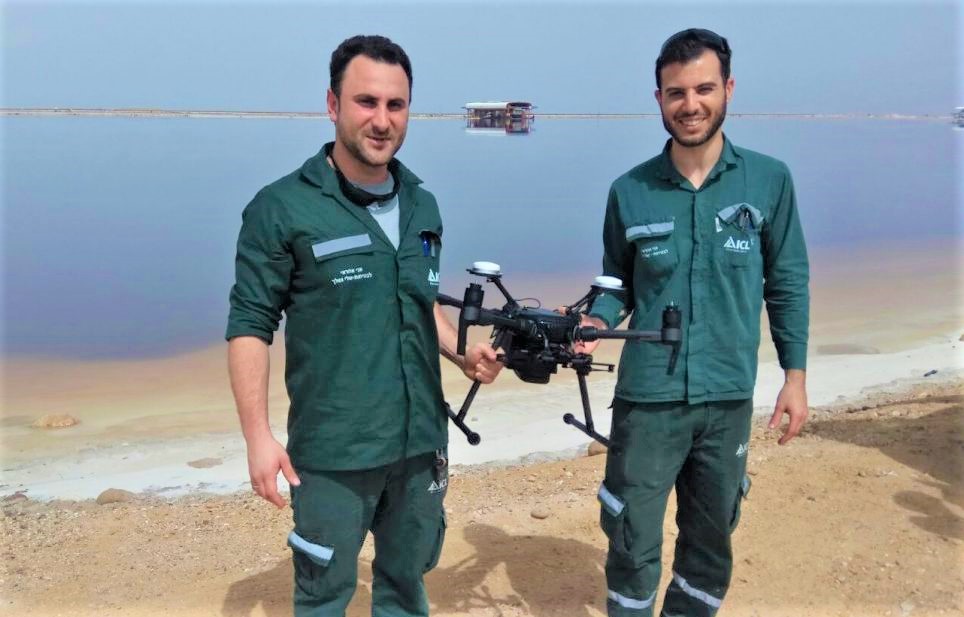Operational Excellence & Innovation
The vision of ICL’s Operational Innovation team is to lead ICL to breakthroughs in operational performance and improved business results based on introducing innovative technologies and a culture of innovation. ICL is focused on a physical transformation via robotics, drones and wearable technology, a digital transformation to optimize process performance based on machine learning implementation and on developing the employees of the future through innovative training, shifting to a more creative mindset with out of the box thinking.
Drones used at ICL sites are equipped with sensitive equipment that monitors activities from above, saving employees from working in dangerous environments, enabling the execution of operational routines quickly and accurately.
This goes hand-in-hand with ICL’s strategy of top-tier safety performance and environmental responsibility. With regards to safety, ICL has long fostered a strong safety culture and enhanced awareness, achieving top quartile safety performance scores within our respective industries. As for environmental responsibility, the operates with a clear commitment to full environmental compliance, which also proactively ensures the company’s Right to Operate.
Using drones for Operational Routines

Drones have become an effective tool to undertake assignments that are dangerous when undertaken by people, as well as save time and money. ICL’s Rotem and DSW sites, in collaboration with ICL’s operational excellence and innovation unit, conducted a successful pilot using drones and implemented autonomous drones systems in the sites. Their ability to easily and accurately access locations over great distances or heights also neutralizes challenging land conditions: drones can easily and quickly fly over unpaved roads, water obstacles, and uneven terrain.
At ICL sites, drones are expected to serve in diverse ways, including inspection of high-voltage networks, monitoring equipment, security and safety. Drones carry equipment, such as cameras and sensors of various kinds, including video cameras, infrared night-sight cameras and various inspection tools (like specific chemical detection tools). In the future they will also deliver light cargo from place to place.
Drones are now entering full service at ICL Dead Sea and ICL Rotem sites. ICL’s Operational Excellence and Innovation team is already looking into additional ways to use drones in ICL operations in order to minimize risks and save time and money in the future. For example, using drones (instead of employees) for maintenance inspections in hard-to-reach and/or hazardous areas.
Wearable and Accessible Technology
ICL views wearable technology, combined with virtual reality (VR) as an opportunity to access and improve the flow of information in operational, maintenance and safety routines. The technology can help field operators to connect to control rooms, provide support remotely, assist in a VR way with training activities and enable hands-free technology. Part of the implementation focuses on safety training in a virtual way, simulating events and training the employees on the right response.
Machine Learning and IoT
ICL is implementing Machine Learning models that use “big data” to optimize the production lines performance and identify failures in advance. The outcome is more efficient, safe and robust process control.
Finding new applications for waste streams and products through data mining and AI
Several of ICL’s products, byproducts and waste streams could be used as raw materials for other products or applications, thus promoting circular economy.
ICL uses data mining as a tool to advance the discovery of potential applications and already had breakthrough results for new uses for byproducts. The main concept is to perform data mining on a huge amount of articles and patents, identify equivalent materials having the same characters, and extract the uses for these materials.
Hackathons
ICL conducted hackathons to find new solutions to several operational challenges that ICL faces. These include new uses for ICL’s minerals and products and reusing or repurposing various waste streams such as used giant tires and other used assets.
Creative thinking methodologies
ICL is implementing Systematic Inventive Thinking (SIT) methodologies to increase the company’s efficiency and to find solutions by utilizing the knowledge and experience of employees combined with creative thinking techniques.
The use of SIT promotes cross-learning, creativity, in-depth analysis and methodical investigation. The SIT is being used to solve operational, safety and ecology related challenges.





